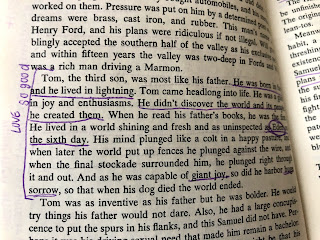How I learned that even the most seemingly inconsequential grammatical choices can change everything.
 |
| Junior year Sophie geeking out over Steinbeck's beautiful language. |
proficiency in the English language. After a dramatic pause rivaling those of award show announcers, my teacher finally stated, "Sophie's paper was the perfect example of being creative and concise," proceeding to point out certain sentences where I had done particularly well. At last! I had finally been recognized for my hard work. Maybe I could pursue this English thing in college...
Grammar is Cool?!
Grammar tends to be the bane of most high-school students' existences in their various English classes: commas, clauses, conjunctions, complements, consonance––the list of idiosyncrasies in the English language is endless, and I only included those beginning with c! In this context, it is no wonder that most learners despise the tedious study of grammar. I used to be one of these students––a hater of all things remotely related to participles, direct objects, or diction––but my despondent attitude was transformed one winter’s day during my junior year of high school. It was AP English Language and Composition, a class filled with as much work as its mouthful of a name implies. Yet, this class inspired immense growth in my own writing abilities, and it was through reading John Steinbeck’s masterpiece, East of Eden, that I gained an appreciation for the subtleties of the English language.
Annotating East of Eden was the first time that I had marked up a book with comments outside of the typical pointers to possible symbols, characterization, or setting. Although the content itself played a part in my respect for the novel, I know that the subtle strategies of Steinbeck in his writing style held a major role in my love for the book. For example, a straightforward passage that describes Tom Hamilton impacted me:
He was born in fury and he lived in lightning. Tom came headlong into life. He was a giant in joy and enthusiasm. He didn’t discover the world and its people, he created them.Steinbeck obviously uses powerful language in this description, but it is also the repetitive nature of the short, simple sentences that really make it effective. Reading this passage, I was repeatedly convinced that Tom was a light in the world, and the sentence structure that Steinbeck employs emphasizes this. I developed a goal to use some of this creative syntax in my own writing.
 |
| "It was ok I guess": the words that divided my sister and I forever. |
Additionally, the content of East of Eden functioned to persuade me of the importance of grammar and word choice in the English language. The idea of timshel is a prime example of how a simple word can completely change a statement’s meaning, or even the meaning of life itself:
The American Standard translation orders men to triumph over sin, and you can call sin ignorance. The King James translation makes a promise in ‘Thou shalt,’ meaning that men will surely triumph over sin. But the Hebrew word, the word timshel––’Thou mayest’––that gives a choice. It might be the most important word in the world.
Lee’s analysis of timshel in the Bible reflects the importance of diction, both in literature and religion. If this one simple word, mayest instead of shalt, could completely alter the meaning of good, evil, and agency in the Christian world, what could other diction and grammatical choices achieve? My perspective was broadened, and I gained significant respect for the specific grammatical decisions that authors make when creating literature.
The Power of Commas (Or Lack Thereof)
A year and a half later, at the end of my senior year, I began reading The Goldfinch by Donna Tartt. Although I have always been a major bookworm, this was the first novel that really pushed my literary limits. While reading it, I was reminded of the beautiful prose that characterized my memories of East of Eden: Tartt appeared to have mastered the English language, and I was in awe of the way she used punctuation to emphasize her ideas. I found myself annotating in the margins, a blasphemous act considering I was reading this book for fun!
Yet, the sentences were so creatively invigorating that I felt they must be marked. For example:
 |
| One of my personal annotations that constituted near sacrilege. |
And in between, I’ve been in a kind of bardo state, flying around in a gray roar, climbing with drop-spattered windows to laddered sunlight, descending to rainclouds and rain and escalators down and down to a tumble of faces in baggage claim, eerie kind of afterlife, the space between earth and not-earth, world and not-world, highly polished floors and glass-roof cathedral echoes and the whole anonymous concourse glow, a mass identity I don’t want to be a part of and indeed am not a part of, except it’s almost as if I’ve died, I feel different, I am different, and there’s a certain benumbed pleasure in moving in and out of the group mind, napping in molded plastic chairs and wandering the gleaming aisles of Duty Free and of course everyone perfectly nice when you touch down, indoor tennis courts and private beaches and –– after the obligatory tour, all very nice, admiring the Bonnard, the Vuillard, light lunch out by the pool –– a hefty check and a taxi ride back to the hotel again a good deal poorer.And that was all one sentence. I wondered if this was even allowed––Tartt stretched the powers of commas and “ands” and imagery to what seemed like the limit. Like the protagonist, Theo, considers himself in the “space between earth and not-earth,” Tartt’s writing almost seems like the space between the normal conventions of the English language and utter nonsense: does this rambling paragraph even qualify as a sentence? And if so, how do her grammatical choices reflect the feelings of Theo in this limbo state of life? These are the questions I found myself asking, not as a result of what the paragraph said, but how the paragraph was written.
Suddenly, in the following paragraph, Tartt switches to clipped and sometimes incomplete sentences:
Of course it’s a lot more than that too. Shock and aura. Things are stronger and brighter and I feel on the edge of something inexpressible. Coded messages in the in-flight magazines. Energy Shield. Uncompromising Care. Electricity, colors, radiance.
This sudden change in sentence structure reflects Theo’s contrasting thoughts: although he feels like he’s in this in-between state, he also feels some change is coming. Tartt utilizes both polysyndeton and asyndeton in this passage, perhaps emphasizing the racing thoughts going through Theo’s head.
Regardless of her intentions, though, Tartt’s writing really illustrated to me that the English language is malleable, and that grammar may just be the most powerful indicator of what an author is trying to communicate. Once I began to employ these strategies, my writing became much more articulate and powerful, evoking compliments from teachers and eventually motivating my decision to minor in English.
Wow, the use of commas and stretching a sentence with a ton of ideas like Tartt did is proof Literature should be an art form. Breaking the conventional forms we're taught, with precision, can really hook a reader.
ReplyDeleteThe beginning of your blog was awesome! I love how you described the way you were feeling. Super awesome! Also, the points you made while analyzing this piece of literature, was phenomenal.
ReplyDeleteI loved reading some of your most prized passages. The writing is fun, and as I read, your passion and admiration became infectious! The way you analyzed their writings, and how the style and choice made a distinct impact on you that you recognized so quickly-- that was awesome! You have a real eye for this stuff! I think you nailed this assignment.
ReplyDeleteI don't think people realize how much power word choice has. I loved how you focused on the importance on grammar and how it can affect an author's writing and voice.
ReplyDelete